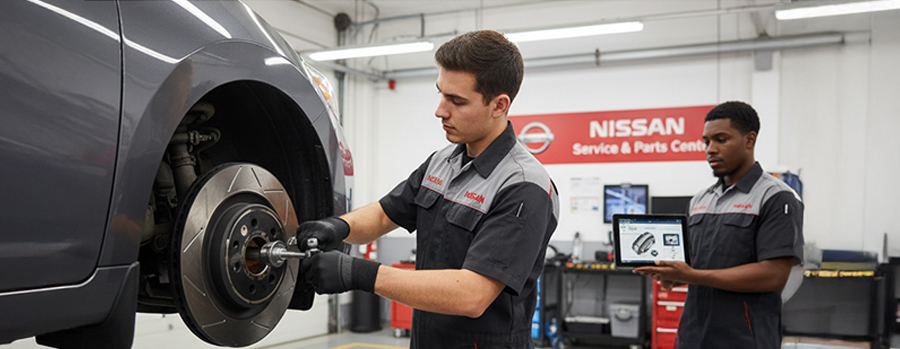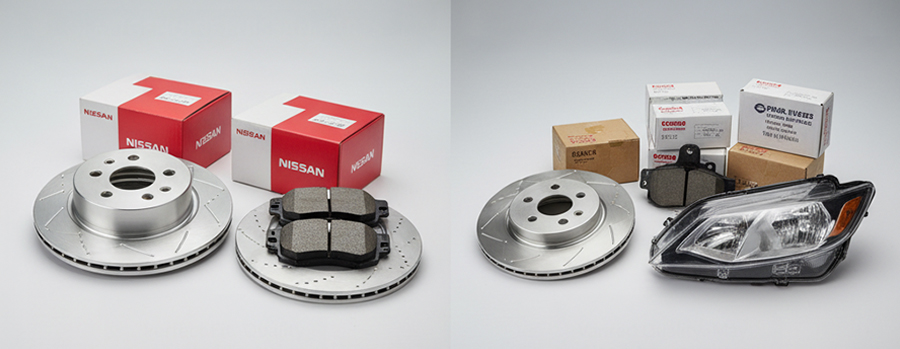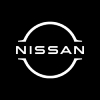11 October 2025
OEM vs Aftermarket Parts: What Nissan Owners Should Know!
You’ve just found out your Nissan needs a new brake pad or even an oxygen sensor. The technician tells you there are two options, OEM parts or aftermarket parts.
The first sounds official, but your gut instantly wonders if that means a bigger dent in your wallet. The second sounds cheaper, easy to order online, and probably "good enough.”
It’s a familiar crossroads for many Nissan owners. Do you go with the trusted original or roll the dice on a bargain? What most drivers don’t realize is that this choice affects far more than just the repair bill. It can change how your Nissan performs, how long it lasts, and even how safe it keeps you on the road.
AtNissan Vero Beach, we’ve seen it all, from quick fixes that caused bigger issues later to smart choices that kept cars running like new for years. Here’s a clear, experience-backed rundown of what you really need to know before deciding between OEM and aftermarket parts.

What Is OEM (Genuine) Parts?
OEM stands for Original Equipment Manufacturer. These are the same parts your Nissan was built with at the factory, designed and approved by Nissan to deliver the perfect fit, performance, and reliability.
When you buy OEM Nissan parts in Vero Beach, you’re getting components that meet the exact specifications of your car and they come with Nissan’s warranty coverage, ensuring long-term value.
For instance, if your Nissan Altima needs a brake rotor replacement, OEM rotors ensure the exact thickness, balance, and performance tested by Nissan engineers, helping your vehicle stop smoothly and safely every time.
What Are Aftermarket Parts?
Aftermarket parts are made by third-party companies that recreate OEM designs. They often cost less and come in a variety of brands, but the quality can vary significantly.
While some aftermarket parts perform well, others may use cheaper materials, have slight fitment differences, or lack quality testing, potentially affecting your vehicle’s performance or safety.
That affordable headlight assembly you found online might fit, but the beam brightness or sealing quality could differ, leading to moisture buildup or poor visibility.
Pros & Cons: Side-by-Side Comparison
|
Factor |
OEM Parts |
Aftermarket Parts |
|
Cost |
Usually more expensive |
Generally cheaper |
|
Quality & Materials |
Nissan-tested and approved |
Varies by manufacturer |
|
Fit & Compatibility |
Perfect fit for Nissan models |
May need adjustments |
|
Warranty Coverage |
Covered by Nissan warranty |
Brand-specific or limited warranty |
|
Long-Term Value |
Preserves vehicle performance and resale value |
May affect long-term reliability |
|
Availability |
Available at Nissan Vero Beach’s Service and Parts Center |
Widely available online or at local shops |
Key Factors That Really Matter: Fit, Quality, Warranty, and Safety
-
Fit:
OEM Nissan parts are engineered to your car’s exact specifications. Poorly fitting aftermarket parts can lead to vibrations, noise, or uneven wear.
-
Quality:
Genuine Nissan parts are tested for durability and performance. Inconsistent aftermarket quality can mean shorter lifespan and more frequent repairs.
-
Warranty Protection:
Using non-OEM parts may affect certain aspects of your vehicle’s factory warranty, especially if a failure occurs due to the replacement part.
-
Safety:
Components like brakes, airbags, and sensors are crucial to your vehicle’s safety. OEM parts maintain the standards Nissan designed into your vehicle.
How to Decide Which Parts Are Right for You
Before making your choice, consider the hidden costs that come with lower-quality aftermarket options:
-
Additional labor if the part doesn’t fit properly.
-
Repeat repairs due to premature wear.
-
Potential damage to other systems or voided warranties.
If you’re unsure, consult with your technician at the Nissan Service and Parts Center in Vero Beach. They’ll help you understand which parts make sense for your repair — balancing cost, quality, and peace of mind.
Why OEM Parts Are Almost Always the Safer Bet

While some aftermarket brands are reliable, OEM Nissan parts consistently deliver the performance, compatibility, and safety your vehicle was designed for. Modern Nissans rely heavily on advanced sensors and software, areas where OEM precision matters most.
However, if you’re considering aftermarket options, be sure to:
For smaller upgrades such as floor mats, roof racks, or spoilers, reputable aftermarket options can work. But for anything related to safety, braking, or engine performance, OEM is the smarter and safer investment.
Where to Get Quality Nissan Parts in Vero Beach
For guaranteed quality and professional installation, visit the Nissan Service & Parts team at Nissan Vero Beach. Here, you’ll find a full selection of OEM Nissan parts along with genuine Nissan accessories in Vero Beach, all installed by factory-trained technicians.
Even the best parts can only perform as intended when installed correctly. That’s why expert installation is just as important as choosing OEM Nissan parts in the first place.
Each Nissan model is engineered with precise specifications, from torque settings to sensor calibrations. Even a slight deviation during installation can affect how your vehicle drives, handles, and communicates with its onboard systems.
At the Nissan Service and Parts Center in Vero Beach, factory-trained technicians know your Nissan inside and out. They use specialized tools, follow manufacturer-recommended procedures, and verify every connection to ensure the part performs exactly as designed.
The Bottom Line on OEM vs Aftermarket Parts
Both OEM and aftermarket parts have their place, but choosing wisely helps ensure your Nissan stays safe, reliable, and efficient.
Choose OEM Nissan parts in Vero Beach for:
-
Safety-critical components like brakes, sensors, and suspension.
-
Vehicles under warranty.
-
Long-term ownership or resale value.
Choose quality aftermarket parts for:
For expert guidance and genuine parts, visit the Nissan Service and Parts Center at Nissan Vero Beach. Their team can help you select the right parts, maintain warranty coverage, and keep your Nissan running exactly as designed.



